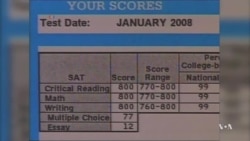The company that administers one of the two most widely-used U.S. college admissions tests recently announced its first major revisions to its test since 2005. The College Boards' changes to the SAT exam drop infrequently used vocabulary words and the mandatory essay, and add passages referencing U.S. historical documents.
When Howard University students from Nigeria and Jamaica were applying to college, they were among the approximately 100,000 foreign students each year who took the SAT.
Now, some have mixed emotions on whether the newly-announced changes will help or hurt international students interested in U.S. schools.
“First of all, they are dropping the vocabulary words, which is, I think, the biggest challenge for most international students,” said Howard University student Peace Umoru.
But Shanique Campbell, also a Jamaican student at Howard, has concerns about adding questions about U.S. historical documents.
"That I believe will be very scary for international students," said Campell. "We are already faced with knowing that we are taking an American-based exam, and so there are a lot of things that we are not prepared for in terms of what to expect on that exam — [for example], cultural references that we will not be able to identify with."
Some 800 of the approximately 3,000 four-year colleges in the U.S. do not use the SAT or its rival test, the ACT, according to the National Center for Fair and Open Testing.
But, the group's Bob Schaeffer says those that do could put foreign students at a disadvantage.
"Students from other countries, particularly those who did not grow up learning English, are at a double disadvantage," he said. "The test is in a foreign language and they did not get test prep. So, it is harder."
The revisions begin in 2016 for the 1.5 million students who take the SAT each year.
Overall, the revisions appear to be positive, says Eddie West of the National Association for College Admission Counseling.
"I feel like the changes are moving the test in a more positive direction insofar as they link up with skills and abilities that students will need to succeed, not just in getting into a college or university, but succeeding once there," said West.
But he agrees that references to U.S. historical documents could put foreign students at a disadvantage.
"It is going to be relatively uncommon for an international student to be really conversant with the Declaration of Independence or Martin Luther King Jr.’s work, or anything else along those lines that might be cited in the test," he said.
West says U.S. colleges need to engage with overseas high schools to learn more about their coursework and make better decisions about admissions criteria.
More than 800,000 international students are in the United States, about four percent of the college population.
When Howard University students from Nigeria and Jamaica were applying to college, they were among the approximately 100,000 foreign students each year who took the SAT.
Now, some have mixed emotions on whether the newly-announced changes will help or hurt international students interested in U.S. schools.
“First of all, they are dropping the vocabulary words, which is, I think, the biggest challenge for most international students,” said Howard University student Peace Umoru.
But Shanique Campbell, also a Jamaican student at Howard, has concerns about adding questions about U.S. historical documents.
"That I believe will be very scary for international students," said Campell. "We are already faced with knowing that we are taking an American-based exam, and so there are a lot of things that we are not prepared for in terms of what to expect on that exam — [for example], cultural references that we will not be able to identify with."
Some 800 of the approximately 3,000 four-year colleges in the U.S. do not use the SAT or its rival test, the ACT, according to the National Center for Fair and Open Testing.
But, the group's Bob Schaeffer says those that do could put foreign students at a disadvantage.
"Students from other countries, particularly those who did not grow up learning English, are at a double disadvantage," he said. "The test is in a foreign language and they did not get test prep. So, it is harder."
The revisions begin in 2016 for the 1.5 million students who take the SAT each year.
Overall, the revisions appear to be positive, says Eddie West of the National Association for College Admission Counseling.
"I feel like the changes are moving the test in a more positive direction insofar as they link up with skills and abilities that students will need to succeed, not just in getting into a college or university, but succeeding once there," said West.
But he agrees that references to U.S. historical documents could put foreign students at a disadvantage.
"It is going to be relatively uncommon for an international student to be really conversant with the Declaration of Independence or Martin Luther King Jr.’s work, or anything else along those lines that might be cited in the test," he said.
West says U.S. colleges need to engage with overseas high schools to learn more about their coursework and make better decisions about admissions criteria.
More than 800,000 international students are in the United States, about four percent of the college population.





